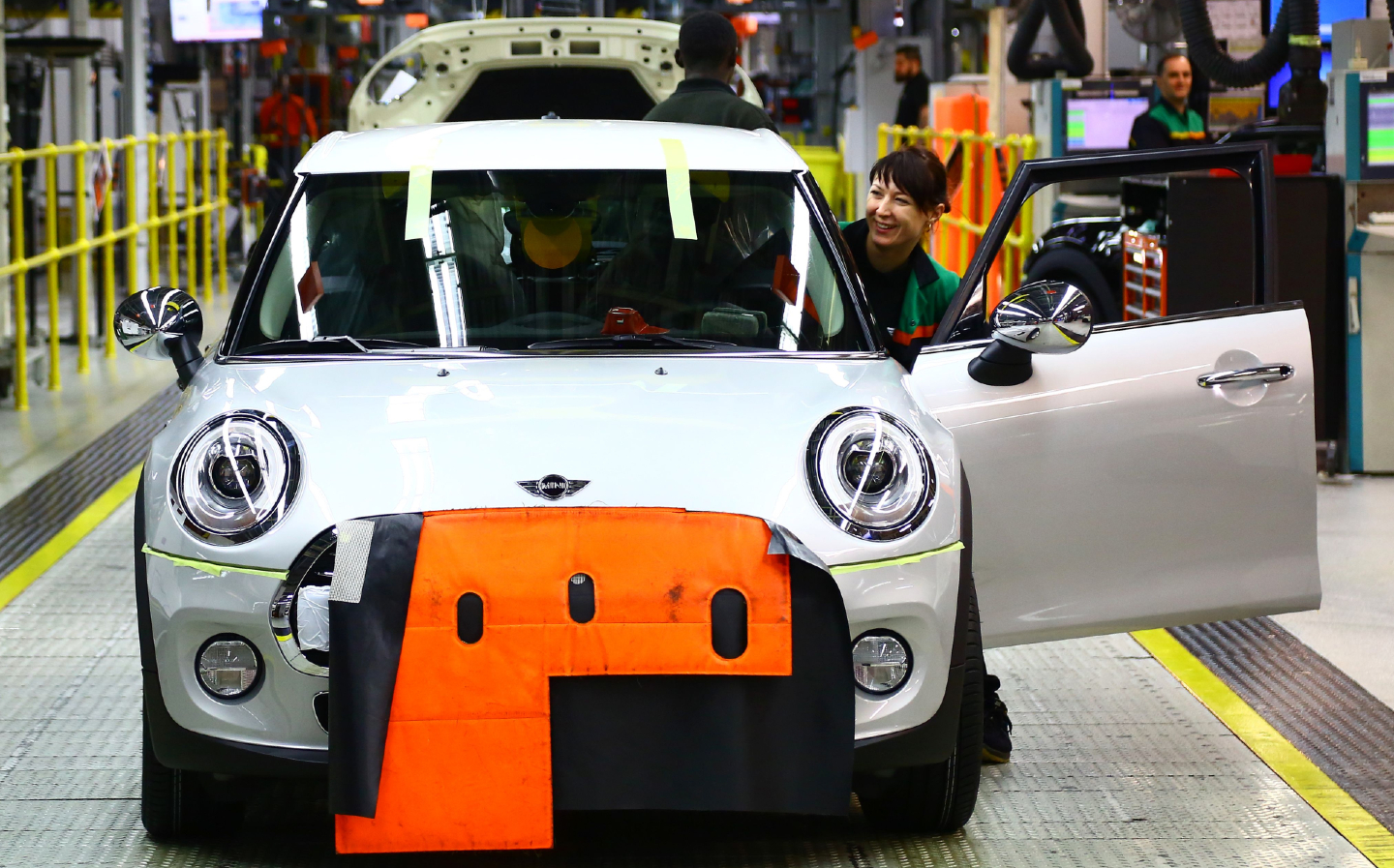Diversity is now a major focus for UK car industry – but we’ve got a long way to go
Driving.co.uk’s editor on a new initiative to bring a more diverse workforce into the car industry, and why it matters
Mike Hawes, the chief executive of the Society of Motor Manufacturers and Traders, said it himself: “Look around the room; it’s evident that we still need to increase our diversity in terms of gender, ethnicity, sexual orientation, abilities, disabilities … all of which are underrepresented in this industry.” He wasn’t wrong, The Great Hall of the Grosvenor Hotel seemed to be a sea of white faces — mostly men.
There were quite a few women there, of course, but very few as a proportion of those attending.

That’s reflective of the sector at large, apparently. According to a new report from the Automotive Council called “Driving diversity, equity and inclusion in the UK automotive industry”, just 12% of people who work in the car business are women.
That’s shocking when you consider the UK workforce at large is 47% female. And last time I checked, women also buy and drive cars. Some surveys have found that women have the final say on eight out of ten of all cars sold, too.
Even worse, the report pointed out that far from an improving situation, the number of women working in vehicle manufacturing actually went into reverse between 2011 and 2019, decreasing by 4%.
It was encouraging to see a number of powerful women on stage, then, addressing the SMMT’s annual dinner, including Rachel Burgess, the editor of Autocar magazine, and Alison Jones, who is both SMMT President and Senior Vice President of Global Circular Economy at Stellantis – the behemoth that owns the Citroen, Peugeot, Fiat and Vauxhall brands (among others).

But as Jones herself pointed out, the car industry should reflect its customers and society, and clearly 12% female is a bloody long way off doing so.
There’s a potential problem, too, with the ethnic composition. The Automotive Council report focused on gender equality (initially) so here we turn to the Institute of the Motor Industry (IMI) Diversity Task Force Report from earlier this year, which revealed that just 7% of those working in the UK automotive retail sector are from an ethnic minority. That’s compared with non-automotive industries where the proportion is 11%. Of the 7% ethnic minorities working in automotive retail, just 1% is black.
Let’s also look at the Office for National Statistics (ONS) data on ethnic make-up of the labour market.
Its figures, based on the census and annual population surveys, don’t focus specifically on the automotive sector but we can see that between 7.2% and 10.2% of all workers identifying as white work in the “Manufacturing” sector, but for those who say their ethnicity is Asian the figure is 4.7-6.5%, for black people it’s 4.9%, mixed race is 5.8% and Pakistani/Bangladeshi 5.3%. Only workers identifying as having Indian ethnicity came close, with 8.3% of them choosing to work in manufacturing.
The other relevant sector might be “Transport and communication” (why they’re lumped together I don’t know). The percentage of white workers choosing to work in that field is between 8.7% and 13.8%. Other ethnic groups are much more willing to work in this sector, comprising 10.2-15.3% of Asian workers, 18.9% of Indians, 14.4% of those identifying as Pakistani/Bangladeshi, 10.3% of black workers and 9.9% mixed race.
Which sounds like good news but I have to say with all honesty that, though I wasn’t looking out for it, I don’t remember seeing a single person of colour at the SMMT dinner. A few must have been there, surely?
Does that suggest those in the top jobs are almost exclusively white? It’s a good question. I’m struggling to recall many people of colour in management positions at car firms.
“Despite talking about this for many years,” Jones told us, “the Automotive Council’s first diversity report shows that as an industry, the results are still sadly, really low. So we want to accelerate those efforts and actions again from today with the UK’s first automotive industry Diversity Charter.”
“I’m struggling to recall many people of colour in management positions at car firms.”
Signing up to the charter is a public commitment by firms in the car industry to create a diverse, equitable and inclusive (DE&I) workforce that is reflective of wider society.
Why is this important? Well, ethically it makes sense, of course, but studies have shown that it’s good for business. As identified by the SMMT, a report from Mckinsey in 2019 found that companies in the top quartile for gender diversity on executive teams were 25% more likely to experience above average profitability than those in the fourth quartile, while those in the same league for ethnic and cultural diversity saw the figure rise to 36%.
According to the SMMT, benefits include increasing employee satisfaction, motivation and engagement, which leads to greater productivity and retention; improving decision making and problem solving; fostering greater creativity from diverse perspectives; and making companies – and the wider sector – more attractive to top talent.
“This Charter is a pivotal moment for the automotive industry,” said Hawes. “UK Automotive is undergoing an immense transformation and our future success depends on attracting the best and brightest talent, irrespective of backgrounds, races, genders, cultures or abilities.

“A rich diversity of skills, perspectives and experience can give us a competitive advantage.”
That diversity of skills can be further enhanced by employing disabled people, Hawes pointed out, specifically highlighting the excellent work of Mission Automotive, which places ex-military personnel within the car industry. Doing so is a boon to car makers and suppliers, because the intensive training, knowledge and skills learnt in the armed forces is incredibly valuable.
“Every year 15,000 highly-trained staff leave the military, many of them with all sorts of amazing skills,” James Cameron, founder and CEO of Mission Motorsport, of which Mission Automotive is a spin-off, told us. He highlighted the example of high voltage electrical systems for EVs, which can go up to 800v on production cars currently.
“’High voltage’ in the military is the terminology for over 1,000 volts,” said Cameron, suggesting not only that ex-military engineers are almost over-qualified to deal with road car electrical systems, but that they can also help “translate” the lingo for people outside the car industry.
Given the challenges facing the car industry right now, I do hope the charter makes the difference, and that should I attend the SMMT dinner in five or 10 years’ time the results will be obvious.
Related articles
- After reading Will Dron’s opinion piece on diversity in the UK car industry, you might be interested in this from The Times: It’s time hand car washes cleaned up their act
- Lewis Hamilton is doing a lot to improve diversity in motorsport. His report from last year recommends 10 steps that will help
- Lewis Hamilton was also ‘disappointed’ by Jackie Stewart and Mario Andretti comments on diversity in F1
Latest articles
- Seven great automotive events to visit this summer, from F1 to art and champagne
- Watch new Porsche 911 GT3 smash Nürburgring record for manual cars
- Skoda Elroq 2025 review: Czech carmaker can’t seem to miss with its electric family cars
- Five best electric cars to buy in 2025
- Should I buy a diesel car in 2025?
- F1 2025 calendar and race reports: The new Formula One season as it happens
- Zeekr 7X AWD 2025 review: A fast, spacious and high tech premium SUV — but someone call the chassis chief
- Denza Z9GT 2025 review: Flawed but sleek 1,062bhp shooting brake from BYD’s luxury arm
- Extended test: 2024 Renault Scenic E-Tech review














